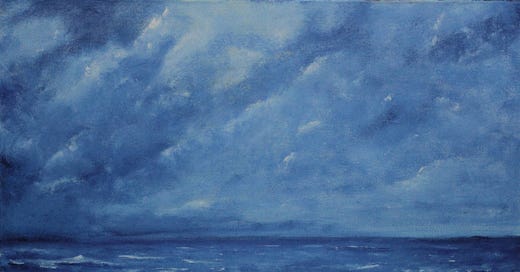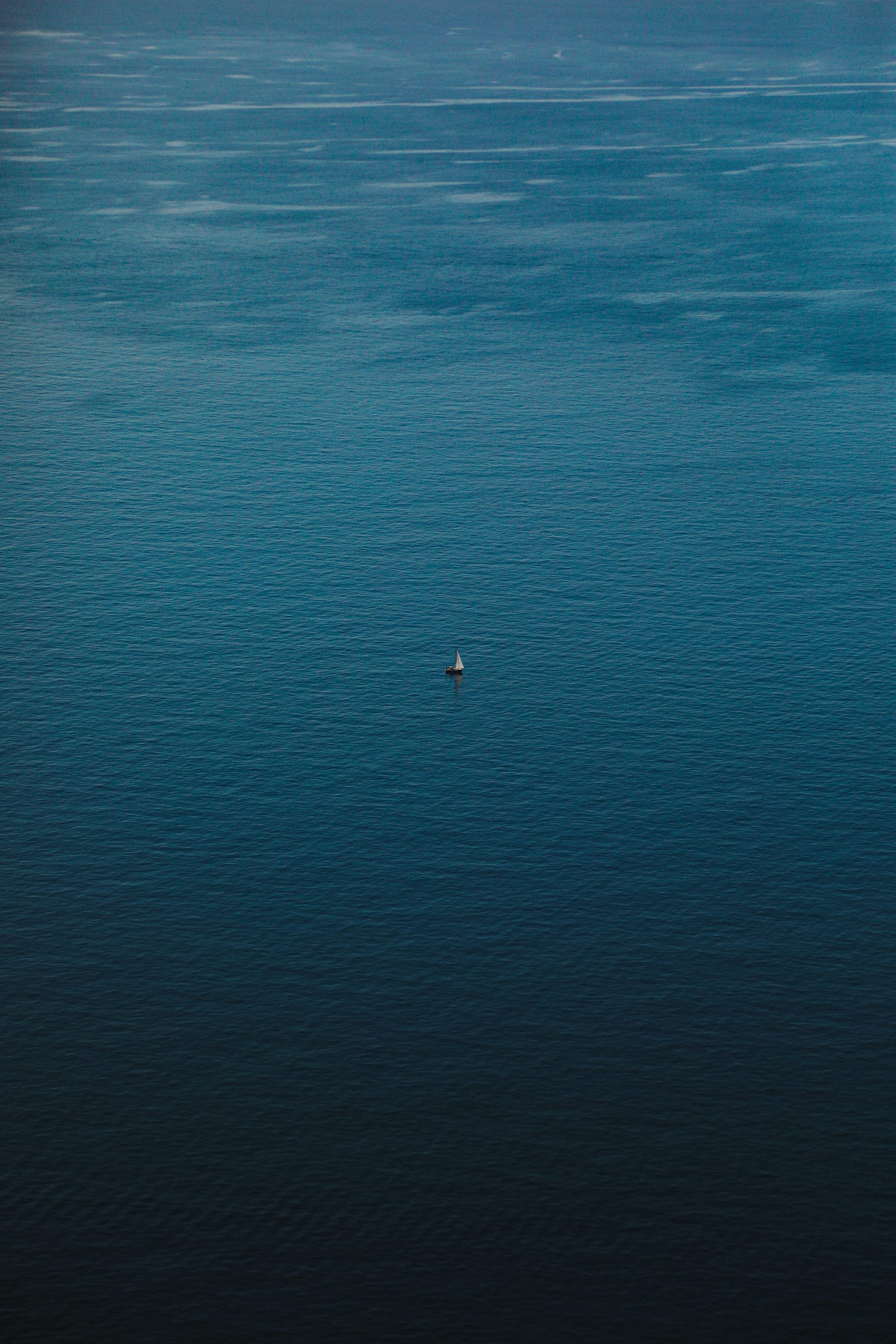The Monk had long since stopped counting the days.
The sea had made him forget the shore. Not that he had forgotten its shape, he remembered the waters rolling into the beach, the green curve as the land rose, the saltgrass meadows near the abbey, and the bells that sang the hours to the world. But those things felt like a water-damaged manuscript with faded illuminations: present, but without the full life of color.
For months - no, it must be years now - he had been adrift, alone in a coracle no wider than his outstretched arms, with little more than a satchel with his breviary, a worn wooden crucifix, and a cask that gathered rain. The horizon had become his constant companion, a silent curve of promise that seemed to never arrive.
He did not know where he was going.
That fact used to drive him to his knees with frustration. Sometimes it still does. Now, he simply rowed when he could, prayed when he could not, and let the sea rock him like a cradle. This, he realized, was the longest vigil of his life.
He was not even sure what had first sent him off into the sea.
He remembered a storm, both outside and inside. The inner storm had come first: a quiet, growing discontent at the abbey. The brethren, they thought they were kind, holy men, but they traded true faithfulness for power grabs, ego, and the ways of the Empire around them. So when the external storm came, lightning crashing into the sea near the harbor, the wind tearing branches from the trees, he had taken it as a sign.
He had pulled the old coracle from the shed, laid his habit and sandals in it, and taken only what he needed to keep himself alive. He drifted the tiny vessel into the roaring, thrashing surf.
He didn’t know if he would survive it.
But he did. Miraculously. Again and again, each day, seeing the sun rise.
Once, the dolphins swam beside him for a day and a night. Once, he awoke in the middle of the night to find the boat surrounded by bioluminescent jellyfish, glowing like stars in the deep. Once, a single gull landed on the prow of his boat and stared at him, unblinking, as a silent message was communicated.
And always, the sea kept him.
He did not always eat, and he rarely slept deeply, but he did not die.
He began to believe, over time, that the journey was not a punishment.
“Unfurl the sails and let God steer us where he will,” he murmured one day, as he often did now, quoting the beloved Venerable Bede. It had become a kind of refrain. He had a small makeshift sail, but more so he unfurled his soul each day, holding it out like the tattered linen in the wind of God’s grace.
Still, there were frequently days he longed for the shore.
Today was one of them.
He sat cross-legged in the coracle, looking up at a sky with several different hues. It was hot, an odd heat for the sea, and the water around him was strangely still, as if even the waves had grown weary of the wandering.
“Lord,” he whispered, clutching the crucifix to his chest, “I am tired of being lost.”
He didn’t expect an answer. One rarely does at sea. The silence that followed, however, felt unusually deep, as though the ocean itself were holding its breath.
Then he remembered Saint Brendan the Voyager.
Brendan the Voyager, the great Irish abbot who set out to sea with his brethren in search of the Terra Repromissionis Sanctorum - the Promised Land of the Saints. He had read the account in the monastery’s scriptorium: the wild islands they had found, the talking beasts, the blazing mountain, and the years of wandering before they reached the land that was only ever shown to them briefly, like a dream given just before waking.
That Saint had never been lost. He had been on pilgrimage.
There was a difference, the Monk thought, between wandering and being called forward.
“Perhaps I have not been lost,” he said aloud, “but led, even if slowly.” He thought about the Israelites as they wandered to the promised land.
And then he laughed, not bitterly, but with the dry, cracked joy of one who knows he has no idea where he is, but believes he is still held in the hand of God.
“Where are You taking me, Lord?”
The sky remained silent.
But the air shifted.
A wind rose from the east, not strong, but steady, and his little boat began to turn, creaking softly. The horizon, flat and empty for so long, now shimmered faintly. He squinted. There, just at the edge of vision - was that…land?
He blinked. Maybe it was a mirage. Maybe it was one of the illusion-islands Saint Brendan saw, the kind that vanished when you reached them.
But maybe not.
He looked at his paddle and the sail. He looked at the horizon.
He could lie back. Let the boat drift. Let the journey keep going forever. Or he could paddle toward the glimmer, even knowing it might disappear.
Something deep in his chest stirred, not courage, exactly, but the tired Monk’s resolve to keep going because not going would be a kind of death.
He took up the paddle.
The gentle wind helped him. Hours passed. The sun arced and dipped, and still he paddled, murmuring psalms between strokes, sometimes crying them. “Out of the deep have I called unto thee, O Lord: Lord, hear my voice…”
The glimmer grew.
It was not the headland of his original homelands. It was not any shore he knew.
But it was shore.
Green things grew there. Tall trees waved in the wind, and the beach curved like a welcoming arm. He let the current pull him now, leaning back as the waves gently carried him toward sand.
His coracle scraped bottom.
He stepped out, legs trembling from disuse, and fell to his knees on the wet shore. He pressed his hands into the sand, kissed the ground, and whispered, “Gratias tibi ago, Domine.”
He did not know where he was.
But he was somewhere.
And the sea, God bless it, had let him go.
Behind him, the boat rocked quietly.
He stood and looked inland. Unsure if there would be a monastery nearby. He heard no church bells. Just trees, and hills beyond.
He might still be a way from where he belongs, but he believed he was nearing it.
The shore had come. Or rather, he had come to it.
Perhaps that was enough.
He took the crucifix from around his neck and drove it gently into the sand.
“Here,” he whispered, “God has led me. Here, I will serve until He leads me again.”
He sat beside the boat, the tide washing in, and began to sing softly a hymn inspired by Saint Brendan:
“Whether on land or sea I go,
The hand of Christ shall guide me so.
In peril, wave, or shadowed night,
Christ be my helm, my sail, my light.”
As the wind whispered through the trees, the Monk was reminded that it was not himself who led him here, but rather the Spirit who hovered over the chaos.
He was grateful, for wherever Christ is, there is home. And he knew Christ was here. In ways known and in some unexpected.
And he would unfurl his soul again tomorrow.




